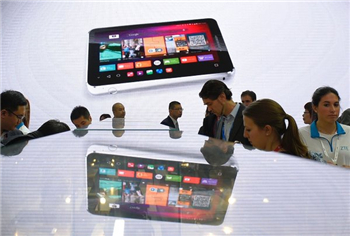(单词翻译:单击)

HONG KONG — ZTE is one of China’s few truly international electronics firms. Yet American companies will now need special permission to sell to it.
香港——中兴通讯(ZTE)是中国为数不多的几个真正国际化的电子企业之一。但美国公司现在将需要获得特别的许可,才能向它销售产品。
The company, which makes smartphones, was found to have violated American sanctions against Iran by selling United States-made goods to the country, according to a Commerce Department statement on Monday. As a result, ZTE will be blocked from buying any technology from American companies without a special license.
美国商务部在周一发表声明称,该部发现这家生产智能手机的公司,向伊朗销售了美国制造的商品,这违反了美国针对伊朗的制裁。因此将禁止中兴从美国企业采购任何技术,除非该企业持有专门的许可证。
ZTE planned to “illicitly re-export controlled items to Iran in violation of U.S export laws,” the Commerce Department said. The sanctions against Iran, many of which were recently lifted, were intended to restrict Iran’s nuclear work.
商务部表示,中兴计划“违反美国的出口法规,私自向伊朗再出口管控物品”。美国针对伊朗的制裁,旨在限制伊朗发展核武器,不过其中有不少制裁措施已经在近期取消。
The export controls against ZTE are unusual because such actions are rarely taken against such large companies. The action underscores how important the push is by the United States to gain China’s cooperation in embargoes intended to combat nuclear proliferation.
针对中兴通讯采取的出口控制并不多见,因为美国很少对这样的大型企业采取此类措施。这一举动突显出,美国多么重视通过施压,来促使中国配合旨在遏制核武器扩散的贸易禁令。
The export controls are also risky because they could easily prompt a backlash from Beijing. Technology has become an increasingly major sticking point in Chinese-American relations, with Washington having openly accused Chinese government-sponsored hackers of stealing American trade secrets.
此类出口控制措施也存在风险,因为它们很容易引发北京作出强烈反应。随着华盛顿公开指责,受中国政府支持的黑客窃取美国商业秘密,技术领域日益成为了中美关系中的一大难点。
Recent scrutiny in the United States has also scuttled some Chinese investments in American tech companies. ZTE’s much larger domestic competitor, Huawei, is effectively banned from selling its telecom network equipment in the United States.
美国最近的审查行动,也让一些中国公司对美国科技企业的投资成为泡影。中兴在中国国内有一个规模比它大得多的竞争对手——华为。这家公司已被禁止在美国出售其电信网络设备。
Beijing has fought back by increasing scrutiny of American companies’ operations in China. It fined Qualcomm for antitrust violations and raided Microsoft’s offices as part of a continuing investigation.
北京对此予以反击,加强了对在华经营的美国企业的审视。官方以违反中国的反垄断法为由给高通(Qualcomm)开出罚单,并在一项持续多时的调查行动中,对微软在中国的多个办公室进行了突击调查。
Chinese state news media has complained bitterly about revelations from the former National Security Agency contractor Edward J. Snowden about American spying and has called for a domestic purge of United States technology.
对于国家安全局(National Security Agency)前承包商雇员爱德华·J·斯诺登(Edward J. Snowden)披露的美国在华的间谍行动,中国官方媒体曾予以强烈指责,并呼吁在境内消除美国技术。
Although analysts said that the export controls against ZTE were most likely aimed at nuclear proliferation rather than being a new jab in heightened technology trade tensions, China’s interpretation of the action was an open question.
尽管分析人士表示,针对中兴的出口控制可能主要是为遏制核武器扩散,而非进一步刺激本就紧张的中美技术贸易关系,但目前尚不明确中国会如何解读美国的这一举措。
“Depending on how both sides read it, this could be a specific case, or it could get overheated and extended,” said Scott Kennedy, a scholar at the Center for Strategic and International Studies, a nonprofit research group.
“这取决于双方如何解读它,有可能会被看作一个特例,也有可能被激化和扩大,”非营利研究组织国际战略研究中心(Center for Strategic and International Studies)学者甘思德(Scott Kennedy)说。
Trading of ZTE’s shares was suspended Monday before the announcement. News of the export controls was first reported by Reuters. ZTE was not immediately available for comment.
在美国商务部发出声明之前,中兴的股票已于周一暂停交易。出口控制的消息最早是由路透社报道的。记者未能及时联系到中兴置评。
ZTE’s status within China is likely to make the export controls big news there. Though not well known in the United States, ZTE is an international champion of the Chinese high-tech industry, with a market capitalization of around $10 billion. After China’s first lady, Peng Liyuan, aroused online criticism by using an Apple iPhone during a 2013 trip to Mexico, she switched to a ZTE phone for a public trip in 2014.
考虑到中兴在中国的地位,中国媒体可能会对出口控制进行重点报道。尽管中兴在美国并不为人所知,但它是中国高科技企业国际化的领头羊,市值约为100亿美元。中国第一夫人彭丽媛2013年访问墨西哥时使用了苹果公司的iPhone,这在网上引发了批评。2014年进行公开访问时,她就换成了一台中兴手机。
In Monday’s statement, the Commerce Department provided two internal ZTE documents to back up the claims that the company was violating sanctions. One, from 2011, signed by several senior ZTE executives, discussed the risks of United States export controls and noted that ZTE had “ongoing projects in all five major embargoed countries — Iran, Sudan, North Korea, Syria and Cuba.” It also said that the Iran project was the “biggest risk.”
在周一的声明中,美国商务部公布了两份中兴的内部文件,用以佐证该部对中兴提出的违反制裁的指控。其中之一是2011年的一份文件,该文件有多位中兴高管签字,文中讨论了美国实施出口控制的风险,并提到“目前我司在伊朗、苏丹、朝鲜、叙利亚、古巴五大禁运国都有在执行的项目”。它还表示,伊朗的项目是“风险最大”的一个。
In the other document, ZTE mapped out the way it could circumvent American export controls in a complex flow chart, including using a “shell” company structure.
在另一份文件中,中兴用一个复杂的流程图,拟定了规避美国出口控制的办法,包括采用一个“空壳”公司的结构。
The new export controls are likely to make business difficult for ZTE. Though the company sells its own branded smartphones and telecom infrastructure equipment, it buys components from American tech companies, using, for example, Qualcomm chips in some of its phones. Given the complexity of the electronics supply chain and the mass production of specific devices, it will probably prove costly for ZTE to shuffle the design and sourcing for its products.
美国新实施的出口控制,可能会让中兴比较难做生意。尽管该公司出售自有品牌的智能手机和电信基础设备,但它也会从美国技术企业采购部件,比如在它的某些手机中采用高通的芯片。考虑到电子行业供应链和特殊设备大规模生产的复杂性,它可能会让中兴在调整设计和为其产品采购部件时,付出不小的代价。
Daniel H. Rosen, a partner at the research firm Rhodium Group, said that given ZTE’s behavior, it would have “required an extraordinary degree of confidence building” between the United States and China to avoid the current situation.
研究公司荣鼎咨询(Rhodium Group)合伙人荣大聂(Daniel H. Rosen)表示,考虑到中兴的行为,要避免出现目前的状况,需要中美之间“建立起非同寻常的信任”。
“That does not appear to have taken place,” he said.
“这点似乎不太可能实现,”他说。


